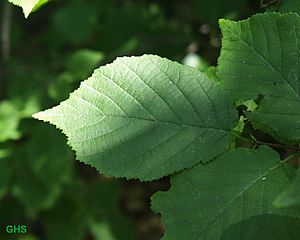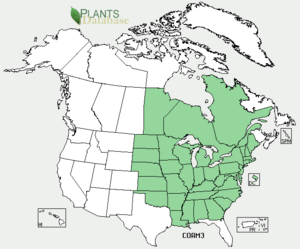American hazelnut facts for kids
Quick facts for kids American hazelnut |
|
|---|---|
 |
|
| Conservation status | |
| Scientific classification |
|
| Kingdom: | Plantae |
| Clade: | Tracheophytes |
| Clade: | Angiosperms |
| Clade: | Eudicots |
| Clade: | Rosids |
| Order: | Fagales |
| Family: | Betulaceae |
| Genus: | Corylus |
| Species: |
C. americana
|
| Binomial name | |
| Corylus americana Marshall, 1785
|
|
 |
|
| Distribution of American hazelnut | |
| Script error: The function "autoWithCaption" does not exist. | |
Script error: No such module "Check for conflicting parameters".
The American hazelnut (Corylus americana) is a type of deciduous shrub. This means it's a bushy plant that loses its leaves every year. It grows naturally in the eastern and central United States, and also in the very southern parts of Canada.
Contents
What Does It Look Like?
The American hazelnut usually grows to be about 2.5 to 5 meters (8 to 16 feet) tall. It can spread out about 3 to 4.5 meters (10 to 15 feet wide). Sometimes, it can even look like a small tree! It often has many stems and branches that spread out, making it look dense and round.
This plant spreads by sending up new shoots, called suckers, from its underground stems, called rhizomes. These rhizomes are usually about 10 to 15 centimeters (4 to 6 inches) below the ground.
Flowers and Nuts
American hazelnut plants bloom very early in spring. They have two kinds of flowers:
- Male flowers: These grow in long, hanging clusters called catkins. They are about 4 to 8 centimeters (1.5 to 3 inches) long. These male catkins actually start growing in the fall and stay on the plant all winter.
- Female flowers: These are tiny and grow in groups of 2 to 5. They are hidden inside protective leaf-like parts of a bud. You can see their little red tips sticking out.
The plant produces tasty nuts that are ready to eat between July and October. Each nut is wrapped in two leafy covers that have jagged edges.
Where Does It Grow?
American hazelnut plants are an important food source for many animals. The nuts are eaten by squirrels, deer, turkeys, woodpeckers, and pheasants. The male catkins are also a key food for ruffed grouse during the winter months.
How Do People Use It?
The nuts from the American hazelnut are safe to eat raw. They are smaller than the nuts you might find in stores, like filberts.
Long ago, Native Americans used parts of the Corylus americana plant for traditional health remedies.
Growing American Hazelnut
People often grow American hazelnut as an ornamental plant in their gardens. This means it's grown because it looks nice. It's also popular in wildlife gardens because it helps attract and feed local animals.
There are even special types of American hazelnut plants that have been mixed with other hazelnut kinds. These mixed plants combine the bigger nuts of other hazelnuts with the American hazelnut's ability to resist a certain fungus found in North America.
This plant grows at a medium to fast speed. It sends up new shoots, giving it a bushy look with many stems. It can grow well in different types of soil and acidity levels. However, it grows best in soil that drains water well. For the best growth and most nuts, American hazelnut plants prefer to be in full sunlight. They can grow in some shade, but they won't be as dense or produce as many nuts.
Images for kids
See also
 In Spanish: Avellano americano para niños
In Spanish: Avellano americano para niños
 | Selma Burke |
 | Pauline Powell Burns |
 | Frederick J. Brown |
 | Robert Blackburn |




